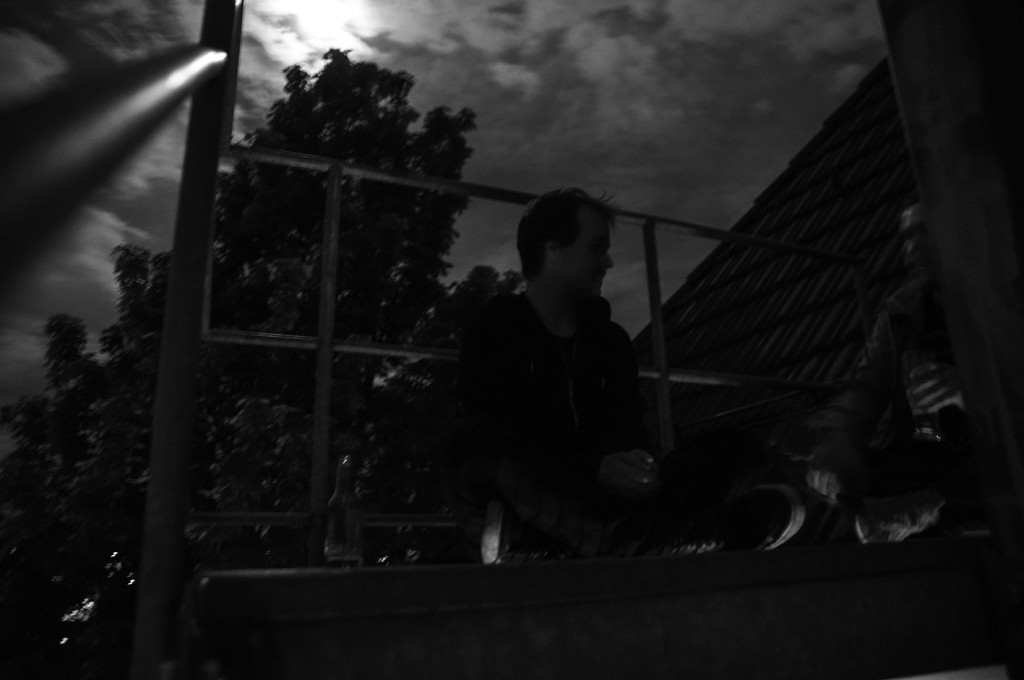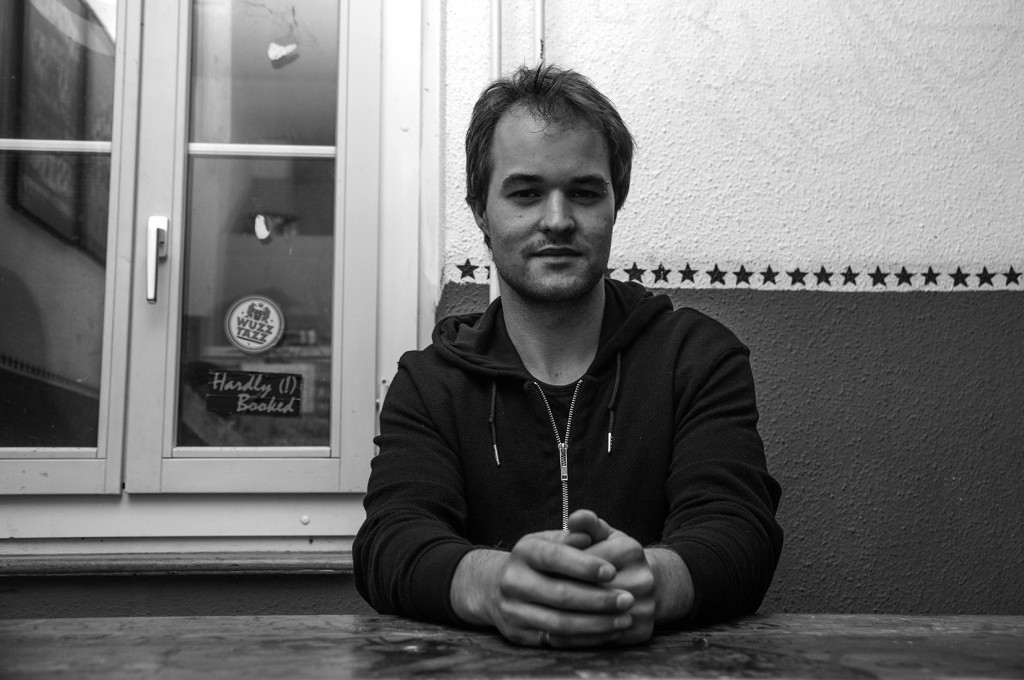At the ILM-Night 2014, a few weeks before the release of his second album, Seb performed at Lucerne’s Sedel club. Michael Volken and Remo Bitzi met Vessel beforehand for a chat. David Huser photographed the Bristolian.
Remo Bitzi In an interview you compared electronic music to punk. What’s your relationship to punk?
Sebastian Gainsborough Punk is one of the things I listened to earlier. However, that was at an age when it was difficult to distinguish what was really punk and what wasn’t. It took some time to recognize its qualities and be able to seek it out more directly.
Michael Volken How relevant was punk in general at that time in Bristol?
SG Bristol’s punk scene had an old and rich tradition. I think this had to do with its size. The scene was never really big, so the cohesion within it was remarkable. Punk was also always a component of the Bristol sound. Above all the anti-establishment aspect of punk has influenced Bristol music.
RB Where does this anti-establishment attitude come from?
SG In my eyes, it can be traced back to the large Afro-Caribbean community. They mostly live in the north of the city, where a lot of artists and musicians have settled. In recent years there have been repeated uprisings because of politics and issues related to urban development. This part of town was a center for punk attitude… Now, because more money is flowing in, there aren’t as many nonprofit-oriented spaces for holding events.
MV And yet, a lot of interesting things are happening in Bristol.
SG Because there are fewer locations for events, the scene is moving closer together. We know each other better and help each other. Perverelist [Tom Ford], for example, is a generation older then Young Echo, and he really helped us a lot. He didn’t think we would take his work away. This competitive mentality, found in big cities like London and even Berlin, is hardly there in Bristol.
MV Not even inside of Young Echo?
SG No. We’re all too good of friends with each other to fight about money. The idea behind Young Echo is that we support each other. When one of us has more success with his music than another, he’s simply teased. Kahn, whose music has had the most success, is often the victim. This is how we deal with success.
RB How important is punk in Bristol today?
SG I haven’t really followed the scene in the last years, so I can’t say, for example, which bands are popular. But there are still many people who make very independent music that has little to do with traditional punk music. I think that in a lot of scenes in Bristol a sort of “Fuck it” attitude reigns. For example, Bristol is known for its sound systems where PAs are built out of whatever resources are available in the moment and parties happen right there where you are. There’s a lot of DIY in that. I also believe that a DIY-attitude is the common denominator in Young Echo. The music itself is very diverse; we’re not in it for big money. The exchange of ideas and mutual inspiration stand in the foreground.
RB Is there a kind of political message in your music?
SG I wish I could say that about my music. I just had a long talk with Holy Other in Berlin about this topic – if music can be political. We came to the conclusion that it’s really difficult today to charge music with a political message that hasn’t already been addressed. On the other hand, one can write music that breaks with people’s expectations and gets them to think. But that’s also difficult.
MV Where do you find inspiration for your music?
SG In the last few years I’ve hardly listened to club music, because it doesn’t fascinate me like it used to. Instead I looked for music that can communicate an intensity. Electronic dance music couldn’t do this for me anymore, so I began to listen to metal again, or classical music. Bands like Swans, who can convey this kind of power, were an extreme influence on me in the last years.
MV Are you trying to create a similar intensity with your music?
SG I don’t know if someone alone can even do this.In a band you have a bassist, a drummer, a singer… Only through this can a band express so much more than a guy alone with his laptop. Although this guy has a lot more possibilities than the band. Performing electronic music is somehow simultaneously too much and not enough.
MV How do you understand the term “live” in the context of electronic music?
SG It depends on if you simply perform the music live or if you really want to play something live. For me those are two different things. The main difference for me is that someone either strictly composes in advance and then sets the single building blocks together live, or instead the music is built from the ground up during a gig, using pedals, synthesizers and other sound sources. Apart from that, the public often just wants to have the tracks served up the way they know them. This makes playing live difficult. Because often when you want to offer the audience something extraordinary, you realize that it isn’t wanted. At the same time, it’s often not taken into account that a track is built in the studio, where every tiny detail is worked on. Reconstructing this live is almost impossible. I think in most cases acts reproduce their studio work on stage and the audience gets what it’s expecting…
MV …and is happy with it.
SG Exactly, they’re happy with it.
MV How would you describe your music?
SG It’s sound system music, which first of all has to be loud. My music goes in the direction of artists like Ben Frost or The Haxan Cloak. It’s really hardly about club music anymore, but rather about a physical intensity. Earlier I was very occupied with club music, but I think that in the last ten years I’ve simply heard too much of it. Of course there are exceptions. For example, I like Andy Stott or Kassem Mosse’s productions.
RB I think a lot of people feel the same way – myself included. Where do you think this paradigm shift is coming from?
SG I think it’s normal for people to continually search for a new kind of experience. We all know how great it is to dance for eight hours to amazing techno in a good club. But when you’re in a club and pretty much only beaten with bass frequencies or you’re given a performance to watch, it’s an entirely different experience. And I think that what’s mostly missing by electronic music is the performance. When you listen to a punk concert, for example, even when the band’s miserable, they can make a crazy fuss of throwing amps or repeating a chord for ten minutes without interruption and you can be carried away with them.
RB Before you spoke of physical intensity. The term is often associated with darker music. Do you think this intensity can also be reached with somewhat more cheerful music?
SG I think in that case it’s about a different kind of intensity. Ultimately it’s about ecstasy. And ecstasy can be triggered in different ways. For one – this sounds a bit sadistic – through pain, but also from an enormous happiness.
RB Bass can be felt, it’s primarily aimed at the body. How do you feel about music that aims for the spirit? Keyword spirituality.
SG I think the word spirituality is too strongly connected to religion. What I personally understand as spirituality has nothing to do with God or religion, but rather with what music can release in people. It can give you something that’s not really explainable. I find it fascinating. I was just recently in Morocco for a project with James Holden, Floating Points and Biosphere. It was about working together with Moroccan musicians. They play a music called Gnawa, which is Sufi music. It’s played by bands which consist of a master who plays a three-stringed bass guitar and additional people who handle a kind of castanet. These castanets produce an enormous high sound that penetrates directly into the brain. The whole thing is very repetitive, very mystical and spiritual. Some listeners to Gnawa fall into a kind of a trance where they surrender to the music completely and roll around on the floor. While listening I had the feeling that somewhere in there the roots of music lie. For us music is coupled with an economic aspect, it’s made more functional. But I believe that many people at our latitude are looking for a similar experience when they go to a concert or club – whether consciously or not.
MV Was it difficult to work with the musicians?
SG Yes, it was difficult. On the one side were these masters with their kind of music, and on the other, there we are, with our electronic devices. We quickly realized that they had everything – the groove, rhythm, dynamic and melody. The tempo continuously varied, so we had to completely change our way of making music. But all in all it was a great experience and unbelievably fun.
RB Was there feedback from the masters?
SG They said they also had fun. Because none of us spoke Arabic, communication while working was somewhat special. It occurred almost exclusively through music. At the beginning, when playing together didn’t quite work yet, it was very frustrating and I began to feel self-doubt. But as the interaction began to work, it was unbelievably great and I believe the masters really did have fun.
RB I was just in Egypt and had the feeling that there it’s about so much more than here by us. People really had something to say, something to express – also in their music. This made me somewhat pensive, because here in Europe we hardly have any issues that possess a similar urgency.
SG This goes back to the theme of if music should be political or not. And for people in Egypt or Ukraine it’s definitely important to be able to politically express oneself with music. In Europe we can at most complain about the poor economy, but it’s not the same thing. This was also a thought I had as I was writing my new album. Somewhere within it swings the feeling of dismay and helplessness in regard to world affairs. But that’s not to say that my album is political.
MV I think this is a good topic to end the interview on.
SG Yes, definitely.

